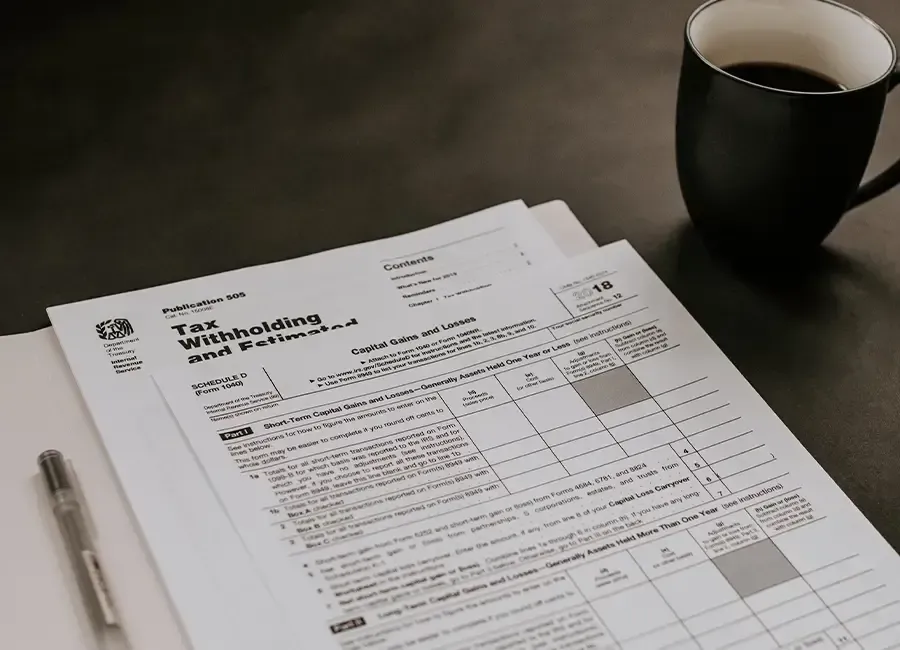Best Sales Tax Tips for Businesses to Help You Save Time and Money
The sales tax tip season is upon us! This is the time of year when businesses start thinking about how to save time and money on their sales tax compliance.
There are a few things that businesses can do to make the most of this time of year. It is crucial that businesses review their respective tax jurisdictions, and consult a sales tax professional to make sure accurate filings and payments are being made. Automating compliance is also suggested; this will allow for improved accuracy, timeliness, and efficiency when managing taxes. Additionally, it is necessary to timely file returns, correctly calculate taxes due, store records accurately and securely, understand distinctions between taxable or non-taxable items within applicable laws, know about exemptions or holiday deadlines that may apply to your business's bottom line, acquire the proper permits if necessary for operations in certain areas, compute precise sales tax amounts from customers at point of sale events before remitting promptly with electronic means when available through compatible software. Doing this can help streamline filing processes as well.

The Basics of Sales Tax
Understanding the basics of sales tax is critical for business owners who want to stay compliant and on top of their obligations. Sales tax is an additional charge imposed by governments at the time of purchasing goods or services; it’s paid to the appropriate governing body.
Businesses are required to collect and submit sales tax to the proper tax authority in the state, city, county, or other jurisdiction in which the product is sold. Businesses owe a portion of their collected tax to state and local governments, use tax to the respective state, and liability tax to the government. Businesses should also have a handle on the sales tax rates in their state and locality and rates for specific products and services.
Businesses are also required to keep accurate records of all sales tax transactions for audit and reporting purposes. Businesses should also know when it’s time to pay their taxes quarterly or annually, and when to file their returns. This is especially important for businesses who are required to collect and remit taxes in multiple states or jurisdictions. Businesses need to stay current on sales tax laws and regulations, so they can make the necessary adjustments in order to remain compliant.

Exemption Certificates
When it comes to sales tax, many businesses deal with sales tax exemption certificates. Exemption certificates allow buyers to avoid having to pay sales tax on purchases.
Businesses should know that they are unable to accept, use, or rely upon an exemption certificate until and unless it is properly completed and meets specific legal requirements. In other words, they are required to regularly review their exemption certificates in order to remain compliant and avoid penalties and interest.
Furthermore, businesses are responsible for retaining the certificates for a period of time; this is typically three to four years. The duration of the time should be based on the time needed for the state or local jurisdiction to audit the taxes collected. Businesses are also required to verify the accuracy of the certificates and investigate if there are any discrepancies or inconsistencies. This may involve verifying the certificate number with the issuing jurisdiction.
Overall, businesses should have a clear understanding of the basics of exemption certificates and how to use them properly. They should know when to accept an exemption certificate, how long to retain the certificate, and how to identify potential compliance.

Accurate Tax Reporting
Accurate tax reporting is arguably the most important aspect when it comes to sales tax. Businesses must have a comprehensive understanding of the regulations and laws that apply to their establishment, as well as take all measures necessary to ensure that they are accurately accounting for all of their sales tax liability.
One of the best ways to stay ahead of the curve when it comes to sales tax is to stay on top of the changes that occur in your jurisdiction. This involves understanding regulations, keeping your records up to date, regularly reviewing all regulations, and staying aware of any new regulations or changes that may affect your business.
It is important to acquire accurate sales information on a regular basis. This involves maintaining accurate records at all times, carefully analyzing all reports, and correct any discrepancies as soon as possible. Lastly, be sure to review state and local sales tax regulations before filing a report. This will help businesses remain compliant and avoid any potential penalties or interest associated with inaccurate tax reporting.

Filing and Paying Your Taxes on Time
Filing and paying your taxes on time is the best way to ensure that your business remains compliant with state and local regulations. Here are some tips and best practices to help you ensure that you are filing and paying your taxes on time:
- Get familiar with the local filing requirements, timeframes, and deadlines for each jurisdiction.
- Schedule reminders for each pertinent filing requirement and deadline.
- Establish a consistent payment process to ensure all taxes are paid on time.
- Identify the correct tax rate and any additional fees to ensure the correct amount is paid.
- Double check the accuracy of all information prior to submitting the payments.
- File all forms necessary during the entire filing period.
Review all forms while waiting for the necessary forms to arrive.
- Process all approved forms and schedule payments in advance.
- Keep a record of all payments and filing requirements to ensure compliance.
- Contact the local tax office in case of any discrepancies or problems with payment.

Use the Correct Tax Rate
It is important to use the correct tax rate when calculating the amount due for each filing requirement. Filing with the wrong rate could result in underpayment of taxes which can have serious consequences. Here are some tips to help you get the rate right:
- Check the local tax codes to determine what type of tax applies to the product or service you are selling
- Contact the local tax office to ensure the correct rate is being used
- Befriend a tax professional or accountant who has knowledge of local tax codes to help answer any questions you may have
- Stay informed of local tax regulations by reading local news and regularly checking the tax office website
- Use an automated tax rate calculator to ensure the correct tax rate is used upon transactions
- Double-check the accuracy of the rate by running a manual calculation to ensure that the same rate is being used

Review your Tax Liability Monthly
It is highly recommended to review your sales tax liability on a regular basis. By doing so, you’ll gain an understanding of the tax obligations in your state, county, and even city for your business. You’ll also be able to identify any errors or issues before they become too costly.
Here are some tips to help you with reviewing your tax liability regularly:
- Ensure all transactions are captured in the automated sales tax calculator.
- Set up a reminder to review sales tax reports each month.
- Make sure the tax liability matches the information in the sales tax report.
- Examine past sales reports to check if missed any sales tax filings.
- Double-check any calculation errors in the automated tax calculator.
- Measure your sales tax liability’s performance with previous months by creating a chart.
- Investigate if any discrepancies or discrepancies arise in your sales tax liability reports.

Annual accounting to save on taxes
Annual accounting is a great way to reduce your taxes. By conducting a comprehensive annual review, businesses can identify deductions, credits, and other tax savings opportunities.
Here are some tips to help you conduct an annual accounting:
- Analyze all tax breaks - Ensure that you take advantage of all the tax benefits your business is eligible for.
- Keep track of your expenses - All the small expenses can add up, so keeping track of everything you purchase can save you money in the long run.
- Maximize depreciation - Accelerating depreciation and getting the most out of their assets can help businesses lower their taxable income and maximize their deductions.
- Make use of tax incentives - Research and take advantage of tax incentives such as the Research and Development Tax Credit or the Low-Income Housing Tax Credit.
- Understand the laws and regulations - Familiarizing yourself with the tax laws and regulations can help you comply with the law and also find potential savings.
- Identify any missed opportunities - Go through prior years’ filings to make sure there were no missed opportunities.
- Look for tax-saving business structures - Establishing a Limited Liability Company (LLC) or a S Corporation (S Corp) can provide tax savings for businesses.
- Hire a tax expert - A tax professional can provide advice on how best to reduce taxes and maximize savings.

Hire a Professional
Hiring a professional for your business’ taxes or financial matters is well worth the cost. Professional advisors provide personalized services tailored to your specific needs. They will make sure you’re taking advantage of all the deductions and tax savings and doing everything the right way.
Here are some tips for hiring a professional:
- Research potential advisors – Find out what qualifications the potential advisor has and what services they specialize in.
- Talk to references – Ask for and check out references from past clients and research online reviews to get feedback on an advisor’s services.
- Know their fees – Before hiring a professional advisor, find out what fees they charge and how often they will bill you.
- Check their credentials – Make sure the advisor you’re considering is properly licensed and has the right qualifications to provide advice.
- Ask questions – Ask the advisor questions about their processes and how they work to make sure they’re providing the best service.
Hiring a professional advisor can save a lot of time and money in the long run, so this is an important step for businesses to take. A professional advisor can provide guidance and advice on the best ways to reduce taxes and maximize savings.
The Takeaway
When it comes to taxes, businesses need to do their homework and be prepared in order to save time and money. Having the right information and resources, as well as seeking professional advice, can make all the difference.
Taxes can be complicated, and the process of filing can be time-consuming and stressful. By following the tips mentioned in this blog post, businesses can come away more informed and better equipped to handle their taxes. With the right knowledge and resources, businesses can save time and money on their taxes and ensure they are in compliance with regulations and laws.
eSenshi is an accounting firm specializing in assisting eCommerce businesses. We provide a variety of services such as Virtual CFO services and Sales Tax Services to assist eCommerce businesses.

Salim is a straight-talking CPA with 30+ years of entrepreneurial and accounting experience. His professional background includes experience as a former Chief Financial Officer and, for the last twenty-five years, as a serial 7-Figure entrepreneur.




